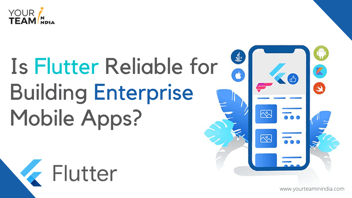
Quick Summary: Flutter is transforming fintech app development by providing a high-performance, cross-platform framework that simplifies building apps for both iOS and Android. This blog explores how Flutter’s robust security features, customizable UI components, and real-time data handling capabilities make it ideal for the financial sector.
Introduction
The financial industry is changing because of digital technology. The market for financial technology is growing, and there is a need to hire developers to create fintech apps.
Today's tech-savvy users expect seamless, intuitive experiences when interacting with their finances. They demand feature-rich apps that prioritize security and data protection. To meet these demands, developers are turning to innovative tools like Flutter.
Recent statistics show that Flutter is the most popular cross-platform mobile framework used by developers globally, and programmers are leveraging its capabilities to benefit the fintech industry as well.
Flutter is an open-source, cross-platform app development framework for building high-performance mobile apps for iOS and Android devices with a single codebase, resulting in faster development times and cost savings.
Are you planning to develop an innovative app solution for your fintech offerings?
In this blog, we'll explore Flutter's capabilities and benefits for Fintech applications, including its security advantages and empowering effect on developers.
Key Takeaways
- Flutter is great for building MVPs due to its scalability, flexibility, and built-in widgets. This allows developers to quickly create an MVP and make changes rapidly to meet specific demands.
- Developing a complete Flutter fintech app is about 30% more cost-effective compared to creating two separate native applications.
Why choose Flutter for a fintech app?
Choosing Flutter for fintech app development ensures efficient, secure, and high-performance applications with a smooth user experience across iOS and Android platforms. Flutter offers an excellent balance between quality and efficiency. Let's check out why choosing Flutter for Fintech app development could be a reliable choice.

1. Cost efficient
Whenever choosing a reliable platform and technology for app development, the cost factor comes first into the mind. The decision between native and cross-platform approaches is often the first hurdle to clear.
When it comes to cost, cross-platform apps clearly emerge as the more economical choice.
For instance, consider that you have selected a native approach for the development of your Android and iOS banking apps. For the native part, you need to hire two separate development teams to handle the iOS platform development using Objective C or Swift and the Android platform development using Java or Kotlin. Certainly, both OSs will have different code bases handled by a separate team of experts.
On the contrary, when the selected approach is cross-platform development using Flutter, the development of fintech apps gets simultaneous due to the shared codebase. The entire development is handled by a single team of developers, saving time and money.
2. Native-like performance
The Dart language and Flutter's reactive framework help create highly performant apps that ensure an exceptional user experience.
Flutter fintech apps are known for their fast performance. They can achieve up to 60 frames per second (fps) and even up to 120 fps on devices with 120Hz updates, which matches native solutions. Since Flutter uses the Skia 2D graphics engine and Dart platform, it ensures smooth graphics and fast performance, just like native apps. All you need to do is collaborate with a Fintech Software Development Company with expertise in Flutter development to acquire native-like performance for your project.
3. Security and Compliance
Developing fintech apps involves working with important financial information and following strict rules. This includes managing identities, securing data, addressing cybersecurity, and complying with international and regional regulations such as KYC and GDPR. Flutter excels in this area because of its programming language, Dart. It offers strong features to ensure security and compliance in fintech app development.
- Flutter employs encrypted storage plugins like `flutter_secure_storage` to protect user information and prevent unauthorized access to sensitive data on devices.
- It enables secure communication via HTTPS, ensuring data encryption during transmission. Developers can also integrate additional libraries for end-to-end encryption to enhance data security.
- Flutter integrates seamlessly with secure authentication services like OAuth and JWT.
- With frequent release updates and patches to address security vulnerabilities, Flutter ensures that fintech apps remain secure against emerging threats.
- Flutter allows for user permissions and access controls within the app that ensure authorized users access only.
- Flutter supports libraries and frameworks that help developers adhere to industry standards like PCI-DSS and GDPR.
- Flutter provides detailed error handling and logging capabilities, enabling quick detection and response to security issues.
4. Integration with APIs and backend services
Fintech apps highly rely on reliable backend services and APIs to perform data management and handle complex financial transactions. Flutter provides seamless integrations with backend technologies. This enables the developers to connect apps with external systems effortlessly. Through this, Fintech apps built with Flutter can efficiently manage large volumes of transactions and data while offering greater security and ensuring optimal performance.
5. Hot reload
Flutter's "hot reload" feature lets developers instantly see changes without having to restart the application. This speeds up development, making it easier to try out new ideas, fix bugs, and make quick changes based on user feedback. For fintech apps, where getting to market fast is crucial, this quick development cycle is a big advantage.
6. Rich UI and widgets
Flutter has a wide range of customizable widgets that can be adjusted to create a unique and engaging user interface. This is especially important for fintech apps that need to stand out with a user-friendly design while also ensuring that complex data and features are clearly and intuitively presented.
7. Real-Time Data Handling
Flutter is great at handling real-time data updates, which is important for fintech apps that need up-to-date information. Whether it's stock prices, account balances, or transaction histories, Flutter makes sure that data is shown accurately and quickly.
8. Competitiveness
In the move to Web 3.0, banks and fintech firms must have a strong digital strategy. They need to keep improving their mobile and web apps quickly and safely. Flutter helps with this by allowing rapid development and testing of features across all devices simultaneously. Its efficiency is evident in challenges where Flutter developers replicated complex designs in significantly less time compared to native solutions, showcasing its potential for accelerated innovation and competitiveness in fintech.
9. Scalability
Flutter can handle both small and large applications. As fintech companies grow and their user base expands, Flutter-based fintech apps can efficiently scale up to meet increasing demands without compromising performance or user experience.
Fintech App Challenges & Flutter Solutions
In the financial technology world, fintech application development demands delivering seamless user experience, security, innovation, and ease of navigation. Flutter, with its efficient approach, effectively addresses the challenges experienced by fintech apps. It reshapes the fintech app development by using a blend of versatility and efficiency, providing a reliable solution to the industry's demands. Below are some of the potential challenges and ways through which Flutter navigates them.
Challenge 1 - Intuitive interfaces
Fintech apps require delivering intuitive and clear interfaces to represent complex financial data. The apps require easy navigation to handle complex tasks like account monitoring or stock trading.
How does Flutter navigate it?
The extensive library of customizable widgets that the Flutter platform is equipped with allows developers to create tailored interfaces. This ensures that the user will have a seamless experience in every activity they are performing on the app.
Challenge 2 - Quick project deployments
Fintech firms require faster deployments and often struggle with resource constraints to deliver a consistent user experience across all platforms.
How does Flutter navigate it?
Flutter's ability to develop apps for several platforms like Android, iOS, and the web with a single codebase is a game-changer. This means that the developer doesn't have to create different codes for varied platforms, leading to faster time to market and lower development costs. Since Flutter has a huge community of developers, finding experienced and skillful Flutter developers is also not a limitation, providing a sense of relief from resource constraints. Hire Flutter developers to eradicate the resource constraints for your projects.
Challenge 3 - Managing huge data volumes
Fintech apps majorly struggle with managing fluctuating and vast data volumes, instant transactions, and performing secure executions.
How does Flutter navigate it?
Flutter seamlessly works with backend services and cloud functions. This ensures that the Fintech apps can access real-time data, scalable storage solutions, and secure transactions.
Challenge 4 - Security
The fintech industry handles critical financial data that requires secure transactions. However, fintech development is at constant risk of data breaches, fraudulent activities, and cyberattacks, and it involves the implementation of robust security measures to maintain data security and integrity.
How does Flutter navigate it?
Flutter provides the Fintech applications with a strong security layer that is vital for financial apps to handle sensitive data. It offers a strong foundation for secure and compliant financial operations by providing safe storage and network protocols. Flutter also integrates well with varied authorization and authentication protocols to ensure regulatory compliance. For instance, it supports biometric authentication, secure storage of sensitive data, and encrypted network communication, all of which are crucial for fintech security.
Challenge 5
The fintech industry requires applications with global access and localization, making their apps work efficiently in different languages.
How does Flutter navigate it?
With its built-in tools, Flutter ensures that fintech software development caters to a diversified user base in their native languages. It achieves this by providing easy-to-use localization tools and supporting a wide range of languages. An intuitive UI with accessibility features makes Flutter a top choice for providing enhanced user access, regardless of their location or language preference.
Challenge 6 - Easy accessibility
The fintech industry relies heavily on accuracy and instant transactions or data retrieval. Any glitch or delay in performance can lead to significant financial losses.
How does Flutter navigate it?
Since Flutter is built on the Dart language, it powers Flutter to compile native code. This ensures that fintech apps will run smoothly and provide quick access to real-time data and operations like fund transfers or stock trading. The use of Dart and native code compilation allows Flutter to deliver high-performance apps that can handle complex financial operations without any delay or glitch.
Top trends in Flutter fintech app development in 2024
With rapid advancements, integrating artificial intelligence (AI) and machine learning within the fintech industry is redefining how fintech applications operate. The fintech industry is using artificial intelligence and machine learning to change how fintech apps work. These technologies improve mobile banking apps with better personalization, more automation, and predictive analysis.
Flutter works well with AI and machine learning libraries, making it great for fintech app development. This combination of Flutter and AI is leading to more fintech apps with AI and machine learning, offering better user experiences and improved financial services. This will significantly change mobile and online banking apps.
Examples of successful apps built with Flutter
We are all well aware of the popular platform Google Pay, which has emerged as a top competitor in the industry. It is a famous and most-used payment platform, with more than 100 million users. Even Google Pay has adopted Flutter as its cross-platform to streamline its development process.
However, rebuilding Google Pay on Flutter was no less challenging. They were required to retrain the entire team on the new languages and rewrite the complete app as it was consistently being updated. They were even required to go through all the essential security reviews where the app had already been launched.
The challenge was huge, but they spent several months building the case for migrating GPay to Flutter. A team of three senior software engineers rewrote the vertical slice of the app, including payments, chat, and homepage. They also ran a few sprints. Leveraging Flutter's abilities, the dedicated developer's team expanded and prepared the app for the beta launch, which was a huge success.
David Ko, The Engineering Director of Google Pay, shared his feedback on the migration. He expressed that everyone loved Flutter, and the real thrill was evident on people's faces as they discussed how quick it was to develop a user interface.
Despite the challenges, Google Pay was successfully launched for beta testing. The rebuilt app on Flutter is not only more efficient to manage and easy to update but also offers a host of new features.

The outcome was truly astonishing- the new codebase was 35% smaller and had fewer code lines. With Flutter, Google Pay was able to scale efficiently and quickly across Android and iOS.
Recommended Read: How to Hire Fintech Software Developers for Your Business?
Conclusion
The clear benefits of using Flutter to create a fintech app are having a big impact on the future of fintech applications. Its ability to work on different platforms, its performance improvements, and the option to customize widgets make it an excellent choice for top fintech apps. As we move forward, developers and Fintech companies are consistently considering Flutter as a strategic tool for building fintech apps.
When it comes to advancing your app with the latest technology, choosing Flutter is a significant step. YTII, a reliable Flutter App Development Company, with its expertise, can guide you in harnessing the full potential of Flutter's capabilities for your app.
Get started with top-rated Flutter developers
Hire a team of flutter development experts with us and obtain the benefits of the technology for your fintech app.
Frequently Asked Questions (FAQs)
How can Flutter be used to develop secure, innovative apps?
Flutter, Google’s open-source UI toolkit, is a powerful platform for developing high-quality, secure, and innovative fintech apps. Its rich feature set, coupled with its flexibility and performance, single codebase, robust security features, and integration capabilities, all contribute to making it an ideal choice for creating fintech solutions that meet the demands of modern users.
Is Flutter good for Fintech?
Choosing Flutter to develop fintech apps is a great decision because Flutter processes are seamless, fast, and cost-effective. Using Flutter for app development allows fintech apps to stay competitive by efficiently customizing and meeting unique business requirements.
How much does it cost to develop a Fintech App?
Fintech app development costs using Flutter range between $16 and $22 per hour, depending on the hourly rates and engagement model chosen for hiring a developer.







